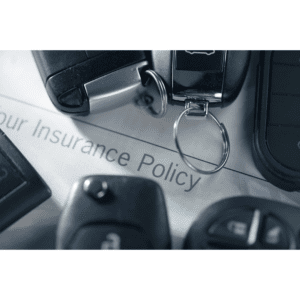Get Quotes
5MinuteInsure.com is not yet available in your area. Check back
soon!
This article has been reviewed by licensed insurance industry expert, Moshe Fishman on December 14, 2023.
The moment you drive off the lot with your shiny new car, it is already worth less than what you paid for it- the more miles you put on it, the more it loses its value.
In the automotive industry, there is a term called "negative equity," which refers to the gap between your car's actual value and how much money you owe on it.
Let's consider the following scenario: you drive off the lot in a new car that's worth $30,000. A year later, you get into an accident where you are not at fault, and your vehicle is completely totaled. Your car's actual cash value at the time of the accident is $21,000, but you still owe your lender $25,000. If you have gap insurance, this $4,000 difference, which would otherwise be your responsibility, would be covered by your policy (minus any deductibles you may have).
Gap insurance protects the consumers by covering the difference between your car's actual cash value and how much you owe on it AND protects lenders against negative equity should you find yourself in an accident where you are not at fault and are unable to pay the difference to your lender.
In order to understand gap insurance and determine whether you need it, let's take a step back and go over how a car loan works. When you buy a car, the dealership will ask for a down payment and then arrange a loan for the rest of the cost. The loan is paid off over time with monthly installments. The problem arises when your car is worth less than what you owe on it.
Gap insurance could help you avoid the financial consequences of totaling or severely damaging your vehicle while still owing money on it, thus creating a gap between what you owe and what the car is worth. This insurance does not replace collision or comprehensive insurance but is an additional policy that can be added to your car insurance plan.
Gap insurance policies will pay off the difference between your car's actual value and the remaining balance on your loan or lease if your vehicle is totaled or stolen. It will also cover the difference in the events of theft, vandalism, and even natural disasters, such as fire and storm.
Although gap insurance is not a requirement when purchasing a car (some lenders may require you to purchase it when you lease a car), it can help save you much more money in the long run.
Gap insurance isn't meant to replenish what you owe entirely but rather pay off the difference between your car's actual value and how much money you owe in specific circumstances where your vehicle is damaged or stolen.
It doesn't cover the remaining balance on your loan if your car is repossessed, nor does it cover the down payment on a new vehicle. Also, this coverage doesn't provide support in the event of financial hardship or disability, and it can't be applied towards car repairs or rental reimbursement while your car is in the shop.
Finally, gap insurance doesn't cover your deductibles-- So, going back to the example above, if you have a $500 deductible, your accident settlement would be $3,500, not $4,000.
Gap insurance sounds great-- but does everyone need it? Not necessarily. Gap insurance is a form of optional coverage and is not a substitute for regular auto insurance. It helps pay off your vehicle loan if your car is destroyed or stolen and you owe more than the car's depreciated value, but it is not required by law.
Whether you need gap insurance depends on your unique situation. This insurance can be beneficial to buyers who owe much more than their car is worth, whether it is because they put a very low down payment on their vehicle (less than 20%) or chose a considerably long payoff period (longer than five years).
Gap insurance can also be especially beneficial to those who expect their vehicle to lose value faster than average, for example, if they drive more than 15,000 miles a year. Sites like Kelley Blue Book can help you gauge your car's expected depreciation rate and determine if this type of coverage is a wise investment for you.
Finally, gap insurance is typically favored by those who lease their car. If something were to happen to their vehicle during the lease period, it could protect them against any financial loss.
Typically, adding gap insurance as supplemental coverage to comprehensive and collision coverage would only add a nominal increase to your monthly payments. If you do decide to purchase gap insurance, it's important to note that getting it through your dealer will often be more expensive as it will go into your loan and accrue interest. Instead, we recommend getting it through an insurance company.

Gap insurance is a form of supplemental coverage for drivers who want to protect themselves against depreciation. When you finance or lease a car, your lender will require you to have collision and comprehensive coverage. These policies protect against damage to your vehicle, but they don't cover the car's entire value. That's where gap insurance can come in handy.
Gap insurance doesn't cover everything, so make sure you know what it does and doesn't cover before you decide to purchase a policy.
The optional coverage isn't necessary for everyone, but in most cases, it is definitely worth the extra cost to add a layer of coverage for peace of mind. To get the best deals on gap coverage, we recommend purchasing it from an insurance company. Insurance rates vary by company and depend on several factors, such as the car's make, model, age, and mileage, so be sure to compare quotes before purchasing.